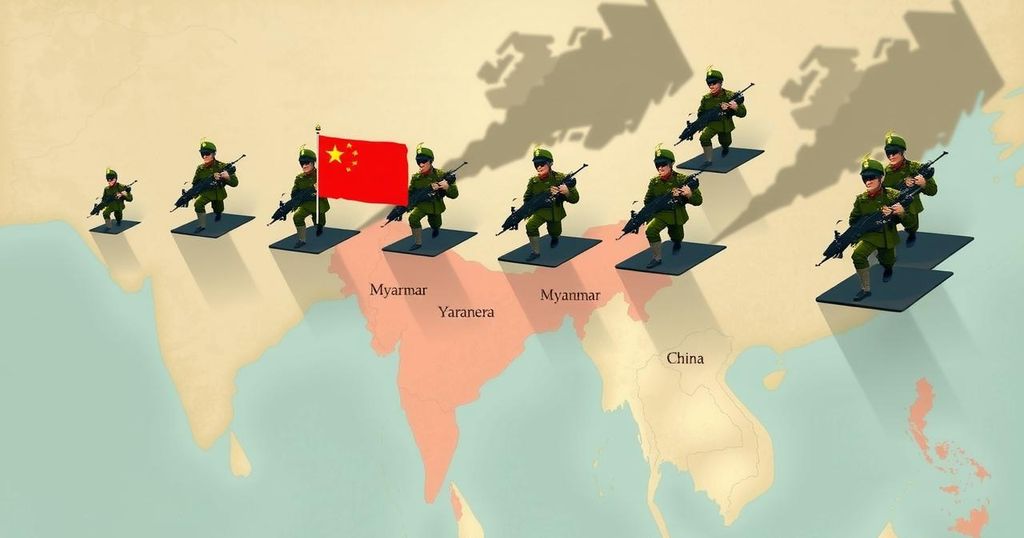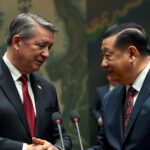Politics
ASIA, BEIJING, CANADA, CHINA, DIPLOMACY, FOREIGN POLICY, HTET MIN LWIN, INSTITUTE FOR STRATEGY AND POLICY - MYANMAR, INTERNATIONAL RELATIONS, ISP - MYANMAR, LIN HTET, MEXICO, MIN AUNG HLAING, MYANMAR, NAN LWIN, NATIONAL UNITY GOVERNMENT, NAYPYITAW, NORTH AMERICA, ONTARIO, PEOPLE ' S DEFENSE FORCES, SOUTH CHINA SEA DISPUTE, TORONTO, UNITED STATES, US-CHINA RELATIONS, WANG YI
Dante Raeburn
Myanmar’s Anti-Military Sentiment Fuels Discontent with China
Anti-China sentiment in Myanmar has surged following the military coup in 2021, fueled by perceptions of Beijing’s support for the junta. A significant portion of Myanmar’s population now holds negative views of China, with protests and boycotts emerging as expressions of dissent. Experts call for a balanced approach to diplomacy, urging Myanmar’s opposition to engage with China constructively while advocating for democracy.
Recent analyses reveal a prominent undercurrent of anti-China sentiment within Myanmar, primarily driven by the public’s perception of Beijing’s complicity in supporting the military junta since the coup in February 2021. Critics argue that China’s perceived prioritization of its Belt and Road Initiative and regional stability compromises support for democratic movements in Myanmar. Activist Lin Htet highlighted growing public disillusionment, suggesting that many believe China is obstructing democratic progress in the nation. A study by the Institute for Strategy and Policy-Myanmar indicates that a significant majority of stakeholders now hold a negative view of China, a sentiment echoed among civil society organizations and ethnic armed groups alike. This shift follows Chinese Foreign Minister Wang Yi’s recent diplomatic engagement with junta leader Min Aung Hlaing, which ignited widespread condemnation among anti-military factions, unified by their discontent with China’s role in Myanmar’s political crisis.
Protests aimed at raising awareness of China’s involvement in Myanmar have recently gained momentum, with activists calling for boycotts of Chinese products to convey their message. During a demonstration outside the Chinese Embassy in Washington, Lin Htet emphasized that their movement is not motivated by racial animosity but by a demand for respectful diplomatic relations, highlighting the tragic loss of Burmese-born ethnic Chinese lives in the fight for democracy. The Chinese Embassy, in response, expressed concern about the situation and called for dialogue, asserting that stability in Myanmar is critical to China, hence their call for non-interference and respect for Myanmar’s sovereignty.
Experts warn against alienating China despite growing dissent, advocating for a pragmatic approach to diplomacy. While understanding China’s interests in the region is essential, analysts contend that Myanmar’s opposition must form a coherent strategy to engage with Beijing effectively. However, the opposition’s current approach lacks a unified method to address the complex political dynamics with China, which continues to recognize the military junta as the legitimate governing authority.
In essence, as the conflict in Myanmar evolves, it is vital for pro-democracy advocates to navigate their growing disenchantment with China while simultaneously seeking avenues for constructive engagement. Recognizing the necessity for diplomacy without compromising democratic aspirations stands at the forefront of discussions among activists and analysts alike, emphasizing a balanced strategy that acknowledges China’s regional interests while persistently pursuing Myanmar’s quest for democracy.
The political landscape in Myanmar has been tumultuous since the military coup in February 2021, which ousted the democratically elected government. This event has not only led to widespread protests and civil unrest but has also shifted the dynamics of Myanmar’s foreign relations, particularly with China. China’s influence in Myanmar, shaped by economic interests through initiatives like the Belt and Road Initiative, has prompted growing public dissatisfaction among various factions within Myanmar. This discontent arises from the perception that China supports the military junta, thereby hindering efforts for democracy and reform. The need for a strategic engagement with Beijing, balancing criticism with the necessity of coexistence, remains a critical discussion point among Myanmar’s opposition and civil society organizations.
In conclusion, the rising anti-China sentiment in Myanmar illustrates a complex interplay between local frustration with the military junta and perceptions of China’s complicity in this crisis. While public sentiment raises significant concerns about China’s involvement, experts emphasize the need for pragmatic diplomatic engagement that does not alienate this powerful neighbor. Striking a balance between advocating for democratic values and understanding regional dynamics will be crucial for Myanmar’s opposition as they navigate their path forward amidst ongoing conflict.
Original Source: www.voanews.com








Post Comment